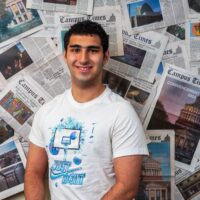It is a question every university student has asked themselves at some point in their academic career. Speaking to friends, I hear the same sentiment come up while they frantically write a paper hours before a deadline that they nearly slept or brain-rotted through. But the inquiry abounds beyond the self-pitying, late-night cram sessions, subsequent pencil-tapping, and empty-minded test periods. To solve this uncomfortable question, the person asking it must peer into their future and determine if there exists a niche for their burgeoning expertise and, just as importantly, where they can find it.
I found myself asking this question rather often during my first year at UR. As a prospective political science major, I did not know where exactly my degree would take me. Today, I can say with some certainty that I have a more crystallized idea of where I want to be in five years. But, as recently as six months ago, I had very few clues. It was only as soon as I became aware and accepting of the fact that I knew little about where I wanted to go that I could begin my journey. In essence, I had to know the problem to solve it. Through accepting the problem and my uncertainty, I realized that I could work through the problem by discussing it with my friends, parents, and professors in my field.
Personal digressions aside, I believe that a deeper lack of tangible hopes and goals is rather common among college students, particularly in an ever-evolving and often unpredictable world. I do not think that students must come into college with a concrete idea of what career they will pursue. Instead, I feel that college is an excellent place for students to discover what appeals to them through the variety of classes and subjects available. One might even argue that the feeling of uncertainty around one’s future life is healthy. Nevertheless, healthy or not, not knowing where you are headed can be very unnerving.
The feeling of not having all the answers is a sensation that we ought to accept more often. It may be that our evolutionary predilection is to fear the unknown because we cannot protect ourselves from that which we do not know. However, if one ignores or avoids what they do not know, it will only be when they leave college that they must confront it.
For that reason, I think that college students should let themselves struggle with their purpose — after all, college is a time of discovery. Moreover, they should learn that finding their vocation does not often happen overnight; it is only through a little soul-searching and trial and error that people discover what exactly they are meant to do. There is no timeline, formula to follow, or amount of thinking that will guarantee that someone meets their goals. That is not to say that people never figure their goals out, just that they probably won’t find them when they expect to.






